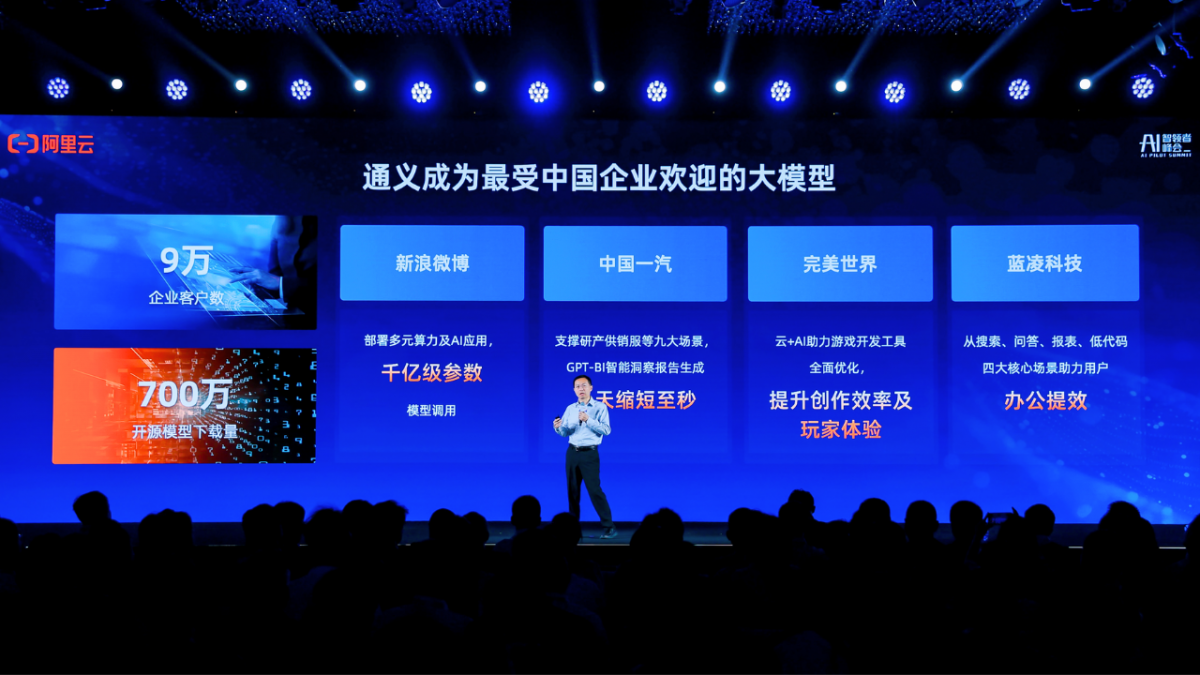


Alibaba Cloud CTO Zhou Jingren revealed that the Qwen family has attracted over 90,000 enterprise deployments. Photo credit: Alibaba Cloud
Over 90,000 enterprises have adopted Alibaba Cloud’s proprietary large language model (LLM) Qwen since it launched a year ago, chief technology officer Zhou Jingren shared on Thursday before unveiling the model’s latest update.
The cloud computing company rolled out Qwen 2.5 and announced major updates to its one-stop generative AI platform Model Studio at the AI Pilot Summit in Beijing.
In China, generative AI is in hot demand. The technology, fueled by LLMs like Qwen and its iterations, has been adopted by around 15% of businesses across the country, according to the China Center for Information Industry Development (CCIID).
“It’s been an exciting journey so far to witness the robust and growing momentum of our family of large language models Qwen, which is truly embraced by our enterprise customers and we have seen so many creative applications of the models from across the industries,” said Zhou.
Retail and telecom companies are leading the foray into generative AI, CCIID data shows, and a number of prominent corporate customers in these fields have turned to Qwen.
Consumer electronics and smart manufacturing company Xiaomi has integrated Alibaba Cloud’s models into its AI assistant, Xiao Ai, to power image generation and comprehension across its latest smartphone range and smart electric vehicle.
Gaming company Perfect World Games has also leveraged Alibaba Cloud’s Qwen to develop games.
In addition to some 90,000 enterprise adoptions over the last 12 months, Qwen has also attracted over 2.2 million corporate users from DingTalk, Alibaba’s intelligent collaboration platform, through the use of AI-powered services.
Those are big shoes for the newest member of the Qwen family to fill, but Qwen2.5 is ready for the challenge.
In fact, the newly-launched model achieves competitive results in various categories among state-of-the-art LLMs according to Alibaba Cloud. It has also demonstrated better reasoning, code comprehension, and textual understanding compared to its predecessor Qwen2.0.
Unlocking the Power of MaaS
Speaking of milestones, Alibaba Cloud’s open-sourced Qwen series has recorded over 7 million downloads on platforms including Hugging Face and Github, the company announced during the summit.
The series of models, which come in a wide size range from 0.5 billion to 110 billion, form the bedrock of Alibaba Cloud’s Model-as-a-Service (MaaS) concept.
Since introducing MaaS in 2022, the company has been working to transform models into readily available and deployable services. It has since launched ModelScope, an open-source community, that now houses over 4,000 models and has garnered a 5-million-strong developer base.
As part of its commitment to make MaaS accessible to corporations of all sizes, Alibaba Cloud also rolled out models and tools on Model Studio to make training and inference more cost-effective.
Models from leading AI companies, including Baichuan AI, are now available on Model Studio, joining over a hundred AI models already on the platform.
Developers can leverage the models for building and scaling their generative AI applications or customizing the models with their unique datasets, all without having to manage any infrastructure.
The updated Model Studio platform also introduces a set of tools for developers to simplify application building. LlamaIndex, an open-source framework that allows developers to connect their LLMs with custom data from various sources and documents, is now available on the platform.
The updates also help developers build agents that can perform complex tasks, with easy integration of Retrieval Augmented Generation techniques for producing contextually relevant outputs.





